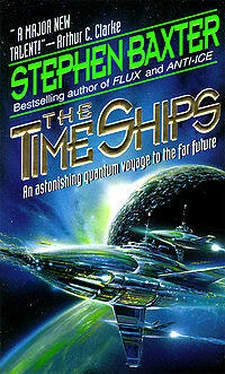“There are no true men?”
“There are descendants of man everywhere. But nowhere will you find a creature who is more closely related to you than — say — a whale or an elephant…”
I quoted to him what I remembered of Charles Darwin: “ ’Judging by the past, we may safely infer that not one living species will transmit its unaltered likeness to a distant futurity…’ “
“Darwin was right,” Nebogipfel said gently.
That idea — that, of your type, you are alone in the Galaxy! — is hard to accept, and I fell silent, gazing up at the blanked-out stars. Was each of those great globes as densely populated as Nebogipfel’s Sphere? My fertile mind began to inhabit those immense world-buildings with the descendants of true men — with fish-men, and bird-men, men of fire and ice — and I wondered what a tale might be brought back if some immortal Gulliver were able to travel from world to world, visiting all the diverse offspring of Humanity.
“Men may have become extinct,” Nebogipfel said. “Any biological species will, on a long enough time-scale, become extinct. But the Constructors cannot become extinct. Do you see that? With the Constructors, the essence of the race is not the form, biological or otherwise — it is the Information the race has gathered, and stored. And that is immortal. Once a race has committed itself to such Children, of Metal and Machines and Information, it cannot die out. Do you see that?”
I turned to the prospect of White Earth beyond our window.
I saw it, all right — I saw it all, only too well!
Men had launched off these mechanical workers to the stars, to find new worlds, build colonies. I imagined that great argosy of light reaching out from an earth which had grown too small, going glittering up into the sky, smaller and smaller until the blue had swallowed them up… There were a million lost stories, I thought, of how men had come to know how to bear the strange gravitations, the attenuated and unfamiliar gases and all the stresses of space.
It was an epochal migration — it changed the nature of the cosmos — but its launch was, perhaps, a last effort, a spasm before the collapse of civilization on the Mother World. In the face of the disintegration of the atmosphere, men on earth weakened, dwindled — we had the evidence of the pathetic mirror on the moon to show us that — and, at last, died.
But then, much later, to the deserted earth, back came the colony machines man had sent out — or their descendants, the Universal Constructors, enormously sophisticated. The Constructors were descended from men, in a way and yet they had gone far beyond the boundaries of what men could achieve; for they had discarded old Adam, and all the vestiges of brutes and reptiles that had lurked in his body and spirit.
I saw it all! The earth had been repopulated; and — not by man — but by the Mechanical Heirs of Man, who had returned, changed, from the stars.
And all of this — all of it — had propagated out of the little colony which had been founded in the Palaeocene. Hilary had foreseen something of this, I thought: the re-engineering of the cosmos had unfolded from that little, fragile huddle of twelve people, that unremarkable seed planted fifty million years deep.
Time wore away slowly, in that bizarre, cocooned place.
For his part, Nebogipfel seemed quite content with our arrangements. He spent most of each day with his face pressed up against the glistening hide of the Universal Constructor, immersed in the Information Sea. He had little time, or patience, for me; it was clearly an effort — a loss — for him to break away from that rich vein of ancient wisdom, and to confront my ignorance — and even more so my primitive desire for company.
I took to mooching, aimlessly, about the apartment. I munched at my plates of food; I used the steam bath; I toyed with the Multiplicity table; I peered out of the windows at an earth which had become as inhospitable to me as the surface of Jupiter.
I had nothing to do! — and in this mood of futility, for I was now so remote from home and my own kind that I could not see how I might live, I began to plumb new depths of depression.
Then, one day, Nebogipfel came to see me, with what he called a proposition.
We were in the room in which our friendly Constructor sat, as squat and placid as ever. Nebogipfel, as usual, was connected to the Constructor by his tube of glistening cilia.
“You must understand the background to all this,” he said, and his natural eye rotated so he could watch me. “To begin with, you must see that the goals of the Constructors are very different from those of your species — or from mine.”
“That’s understandable,” I said. “The physical differences alone—”
“It goes beyond that.”
Generally, when we got into this sort of debate — with myself cast in the role of the Ignoramus — Nebogipfel showed signs of impatience, of a salmon-like longing to return to the gleaming depths of his Information Sea. This time, though, his speech was patient and deliberate, and I realized that he was taking unusual care over what he had to say.
I began to feel uneasy. Clearly the Morlock felt he had to convince me of something.
He continued to discuss the goals of the Constructors. “You see, a species cannot survive for long if it continues to carry around the freight of antique motivations that you bear. No offense.”
“None taken,” I said drily.
“I mean, of course, territoriality, aggression, the violent settlement of disputes… Imperialist designs and the like become unimaginable when technology advances past a certain point. With weapons of the power of die Zeitmaschine’s Carolinum Bomb — or worse — things must change. A man of your own age said that the invention of atomic weapons had changed everything — except Humanity’s way of thinking.”
“I can’t argue with your thesis,” I said, “for it does seem that — as you say — the limits of Humanity, the vestiges of old Adam, were at last enough to bring us down… But what of the goals of your metal super-men, the Constructors?”
He hesitated. “In a sense a species, taken as a whole, does not have goals. Did men have goals in common, in your day, save to keep on breathing, eating, and reproducing?”
I grunted. “Goals shared with the lowest bacillus.”
“But; despite this complexity, one can — I think — classify the goals of a species, depending on its state of advancement, and the resources it requires as a consequence.”
A Pre-Industrial civilization, Nebogipfel said — I thought of England in the Middle Ages — needs raw materials: for food, clothing, warmth and so forth.
But once Industry has developed, materials can be substituted for each other, to accommodate the shortage of a particular resource. And so the key requirements then are for capital and labor. Such a state would describe my own century, and I saw how one could indeed regard, in a generic sense, the activities of mankind in that benighted century as driven in the large by competition for those two key resources: labor and capital.
“But there is a stage beyond the Industrial,” Nebogipfel said. “It is the Post-Industrial. My own species had entered this stage — we had been there for the best part of half a million years, on your arrival — but it is a stage without an end.”
“Tell me what it means. If capital and labor are no longer the determinants of social evolution…”
“They are not, because Information can compensate for their lack. Do you see? Thus, the transmutating Floor of the Sphere by means of the knowledge invested in its structure — could compensate for any shortage of resource, beyond primal energy…”
Читать дальше
Конец ознакомительного отрывка
Купить книгу









